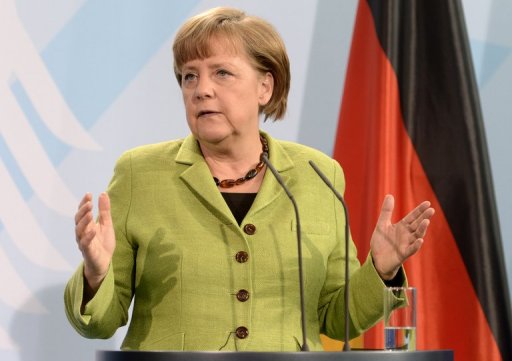Chancellor Angela Merkel faced a knife-edge state election on Sunday that could provide vital clues to Germany’s political landscape 16 months before a national vote likely to hand her a third term.
With most eyes fixed on critical national elections in France and Greece, the 2.8 million people in the small state of Schleswig-Holstein, in Germany’s north, will deliver their verdict on Merkel and her eurozone crisis-fighting record.
Latest polls showed Merkel’s conservative Christian Democrats (CDU) roughly neck-and-neck with the opposition Social Democrats (SPD) at around 30 percent.
However, voters seemed near certain to boot out the current state coalition of CDU and the pro-business Free Democrats (FDP) — who also govern together at national level — amid plunging support for the FDP.
And with a vital state election a week later in the populous and industrial North Rhine-Westphalia, the FDP’s performance in the two votes will determine how stable Merkel’s junior partners remain in the run-up to the national election.
If the FDP fails to beat the five-percent mark needed for representation, “this could be a bad sign for the vote in North Rhine-Westphalia, where they could suffer another defeat leading to a leadership crisis,” said Carsten Kochschmieder, political scientist at Berlin’s Free University.
The most likely result of the vote in Schleswig-Holstein was a “grand coalition” of the two main parties, potentially pointing the way to a similar constellation at national level come next September or October, analysts said.
Merkel governed with a grand coalition with the Social Democrats during her first term from 2005 but gleefully ditched the opposition in 2009 in favour of the FDP, which achieved a stunning 14.6 percent in the election.
But the CDU-FDP marriage proved rocky from the start and polls showed a second grand coalition led by Merkel at national level was a strong possibility.
Another party to watch in Sunday’s election is the upstart Pirate Party, which has rocked German politics by cruising into two state parliaments on a platform of greater political transparency and Internet freedom.
Polls showed the Pirates were likely to gain enough votes to win seats in the state parliament in Schleswig-Holstein.
The election would have little impact on the make-up of the Bundesrat, the upper house of parliament where Germany’s 16 states are represented, and Merkel’s personal popularity remains high.
But, as Germany’s respected weekly Die Zeit noted, the Schleswig-Holstein vote, along with the North Rhine-Westphalia election, would point to “whether Germany’s most popular and Europe’s strongest politician has a chance of staying in power.”

COMMENTS
Please let us know if you're having issues with commenting.